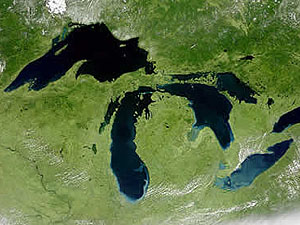Great Lakes Compact
Milwaukee Riverkeeper worked in collaboration with groups locally and throughout the Great Lakes Region to advocate for passage of the Great Lakes Compact, to protect Lake Michigan and the Great Lakes from water diversions and other threats to lake health. We continue to monitor the implementation of the compact locally.
Enforcing the Compact: Sign the Pledge!
 The Great Lakes Compact, signed into federal law in 2008, is a historic agreement developed to protect the Great Lakes by regulating how its waters are used and managed. According to the agreement, the waters of the Great Lakes must stay within the Great Lakes Basin and must be managed to meet the needs of all citizens who live there.
The Great Lakes Compact, signed into federal law in 2008, is a historic agreement developed to protect the Great Lakes by regulating how its waters are used and managed. According to the agreement, the waters of the Great Lakes must stay within the Great Lakes Basin and must be managed to meet the needs of all citizens who live there.
The Compact allows for only a few narrowly defined exceptions to the ban on diverting water outside the Basin. Diversion applications that do not meet the Compact’s strict criteria for exceptions to the ban cannot be approved. Failure to enforce the Great Lakes Compact by allowing unlawful diversions will jeopardize the integrity of this important legislation and the Great Lakes.
When you sign this pledge, you send a message to policy makers and elected officials that you support the Great Lakes Compact and expect them to do the same.
Passing the Great Lakes Compact
Milwaukee Riverkeeper worked with state and federal partners and with our members to advocate for passage of a strong Great Lakes Compact, and in 2008 the Great Lakes-St. Lawrence River Basin Water Resources Compact was signed into law.

The process has been long with its first major accomplishment in 2005 when following a nearly five-year negotiation, the Governors of Illinois, Indiana, Michigan, Minnesota, New York, Ohio, Pennsylvania and Wisconsin reached agreement on the Compact. The Compact provides a comprehensive management framework for achieving sustainable water use and resource protection. The eight Great Lakes States reached a similar, good faith, agreement with Ontario and Québec.
The Great Lakes are a national treasure—important to our nation and the world as both an environmental and economic asset. Our national economy depends on the Great Lakes for industrial uses, hydropower, maritime commerce, agricultural irrigation and many other uses. The Great Lakes are also a globally unique and important environmental resource. The Compact will ensure that the Lakes are used sustainably in order to continue to provide benefits to us all.
 The Compact includes the following points:
The Compact includes the following points:
- Economic development will be fostered through sustainable use and responsible management of Basin waters.
- In general, there will be a ban on new diversions of water from the Basin but limited exceptions could be allowed in communities near the Basin when rigorous standards are met.
- Communities that apply for an exception will have a clear, predictable decision making process; standards to be met; and, opportunities to appeal decisions. These processes and standards do not exist under current law.
- The States will use a consistent standard to review proposed uses of Basin water. The States will have flexibility regarding their water management programs and how to apply this standard.
- Regional goals and objectives for water conservation and efficiency will be developed, and they will be reviewed every five years. Each State will develop and implement a water conservation and efficiency program that may be voluntary or mandatory.
- A broad, bi-partisan consensus has been built in support of the Compact. The Compact was developed in collaboration with regional partners who have also played a key role in its implementation. Members of Congress, Mayors, local government officials and stakeholders have all been instrumental.
